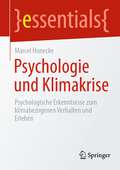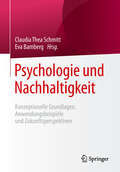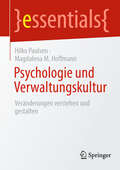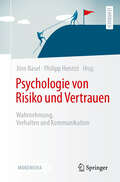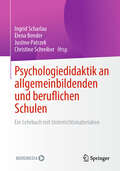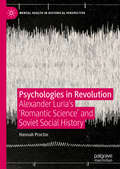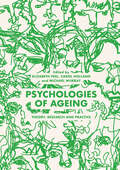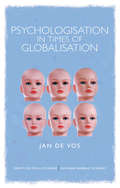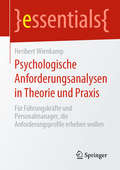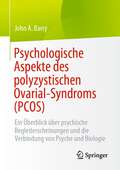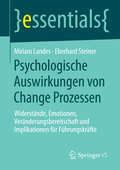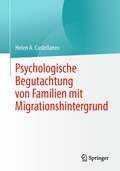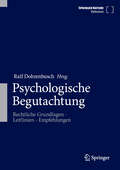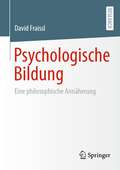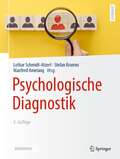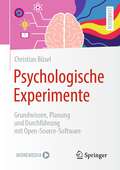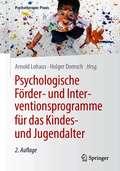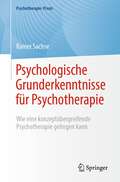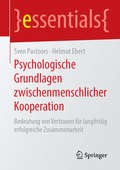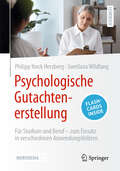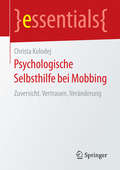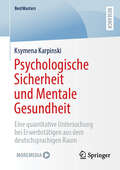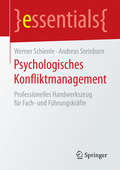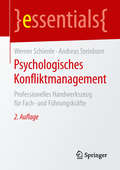- Table View
- List View
Psychologie und Klimakrise: Psychologische Erkenntnisse zum klimabezogenen Verhalten und Erleben (essentials)
by Marcel HuneckeAuf der Grundlage umweltpsychologischer Erkenntnisse werden Ansatzpunkte und Strategien zur Förderung nachhaltigen Verhaltens benannt. Eine sozial-ökologischen Transformation erfordert jedoch nicht nur die Veränderung von spezifischen Verhaltensweisen, sondern umfassende Veränderungen in den bestehenden Lebensstilen. Der Ansatz der psychischen Ressourcen verfolgt dieses Ziel durch die Berücksichtigung des subjektiven Wohlbefindens als zentrale Motivationsquelle für nachhaltiges Verhalten. Hierbei gilt es auch die durch die Klimakrise verursachten Gefühle der Macht- und Hilflosigkeit zu überwinden, um das individuelle und kollektive Engagement für den Klimaschutz zu stärken.
Psychologie und Nachhaltigkeit: Konzeptionelle Grundlagen, Anwendungsbeispiele und Zukunftsperspektiven
by Eva Bamberg Claudia Thea SchmittDieser Sammelband setzt sich zum Ziel, wesentliche Beiträge und Potenziale der Psychologie für (globale) Nachhaltigkeit herauszuarbeiten, innerhalb der psychologischen Disziplin (weiter) für den gesellschaftlichen Nachhaltigkeitsdiskurs zu sensibilisieren und künftige Forschungs- und Anwendungsperspektiven in den interdisziplinären Dialog einzubringen. Die Psychologie als Wissenschaft vom Erleben und Verhalten des Menschen bietet in vielfältiger Weise konzeptionelle sowie empirische Anknüpfungspunkte für den aktuellen Diskurs um nachhaltige Entwicklung – insbesondere im Hinblick auf die Umsetzung der als Agenda 2030 im September 2015 von den UN proklamierten Sustainable Development Goals.
Psychologie und Verwaltungskultur: Veränderungen verstehen und gestalten (essentials)
by Hilko Paulsen Magdalena M. HoffmannVerwaltungen entwickeln sich kontinuierlich in einem Spannungsfeld aus Bewahren und Verändern weiter. Der Faktor Mensch und die jeweilige Verwaltungskultur spielen dabei eine zentrale Rolle. Wer in Verwaltungen Veränderungsprozesse anstoßen und begleiten möchte, profitiert von psychologischem Wissen über menschliches Erleben und Verhalten und ein Verständnis von der jeweiligen Verwaltungskultur. Dieses essential bietet Modelle zum besseren Verständnis von Veränderungen im Verwaltungsalltag und zudem Ansätze und Methoden zur Gestaltung von Veränderungsprozessen.
Psychologie von Risiko und Vertrauen: Wahrnehmung, Verhalten und Kommunikation
by Philipp Henrizi Jörn BaselPsychologie von Risiko und Vertrauen Unsicherheit und Unplanbarkeit nehmen zu, globale Krisen, Fake News und Skepsis erodieren bestehendes Vertrauen. Zusätzlich wird diese Dynamik durch technologische Entwicklungen befeuert, deren Akzeptanz maßgeblich von einer subjektiven Bewertung der Chancen und Risiken abhängt. Risikokompetenz, Risikomündigkeit oder auch Vertrauensaufbau sind hierbei zentrale Schlagwörter, welche exemplarisch für einen fundierten Umgang mit Risiko und Vertrauen stehen. Dieses Buch bietet Ihnen in 11 Kapiteln eine praxisorientierte Einführung in die Psychologie von Risiko und Vertrauen. Sie vertiefen Ihre Kenntnisse über Risikokommunikation im Krisenfall, den Umgang mit Misstrauen und auch wie es gelingt Vertrauen als entscheidendes Bindeglied zu etablieren, um Innovation und Fortschritt zu ermöglichen.Die didaktisch eingängig strukturierten Inhalte mit Lernzielen und Kontrollfragen stützen sich auf bewährte psychologische und aktuelle wissenschaftliche Erkenntnisse. Vielfältige Praxisbeispiele, wie z.B. von einer Extremsportlerin, einem Flight Safety Officer und einem katholischen Missbrauchsaufklärer, vermitteln einen persönlichen Bezug und zeigen Ihnen, wie vielschichtig sich der Umgang mit Risiko und Vertrauen gestalten kann. Dazu erhalten Sie hilfreiche Zusatzmaterialien über die Begleitwebseite. Kapitel 4 ist unter einer Creative Commons Attribution 4.0 International License über link.springer.com frei verfügbar (Open Access).Zielgruppen Studierende der Wirtschaftspsychologie und anderer Studiengänge im Bereich Wirtschaft, Entscheidungsträger, Führungskräfte und alle, die sich für den Umgang mit Risiko und Vertrauen interessieren.Zu den Herausgebern Prof. Dr. Jörn Basel – Professor für Wirtschaftspsychologie an der Hochschule Luzern (HSLU). Mitglied des First International Network on Trust (FINT). Seine Forschung beschäftigt sich unter anderem damit, wie Organisationen verlorenes Vertrauen wiederaufbauen können. Prof. Dr. Philipp Henrizi – Professor und Programmleiter Governance, Risk and Compliance der Hochschule Luzern (HSLU). Diverse Forschungsprojekte und Publikationen im Bereich Risk Management und Compliance Management. Mitglied im European Risk Research Network (ERRN).
Psychologiedidaktik an allgemeinbildenden und beruflichen Schulen: Ein Lehrbuch mit Unterrichtsmaterialien
by Ingrid Scharlau Elena Bender Justine Patrzek Christine SchreiberDas von Wissenschaftler*innen und Lehrer*innen gemeinsam verfasste Lehrbuch bietet vielfältige didaktische Ansätze zur Gestaltung des Psychologieunterrichts an Schulen. Seine Besonderheit ist, dass neben einer umfassenden Vorstellung und Reflexion psychologiedidaktischer Ansätze auch praktische Implikationen für den Psychologieunterricht berücksichtigt werden. Konkrete Unterrichtsmaterialien, die zum Download zur Verfügung gestellt werden, dienen dazu, die didaktischen Ansätze praktisch zu prüfen und aktuelle psychologische Forschung in den Psychologieunterricht einzubeziehen. Zusätzlich umfasst das Buch auch didaktische Themen, die noch nicht intensiv ausgearbeitet wurden – beispielsweise Überlegungen zur Digitalisierung und zu Selbsterfahrung im Psychologieunterricht. Das Lehrbuch richtet sich gleichermaßen an Studierende des Unterrichtsfachs Psychologie, Referendar*innen und Psychologielehrkräfte und fördert die systematische Auseinandersetzung mit einer bisher wenig beachteten Fachdidaktik.
Psychologies in Revolution: Alexander Luria’s 'Romantic Science' and Soviet Social History (Mental Health in Historical Perspective)
by Hannah ProctorThis book situates the work of the Soviet psychologist and neurologist Alexander Luria (1902-1977) in its historical context and explores the 'romantic' approach to scientific writing developed in his case histories. Luria consistently asserted that human consciousness was formed by cultural and historical experience. He described psychology as the ‘science of social history’ and his ideas about subjectivity, cognition and mental health have a history of their own. Lines of mutual influence existed between Luria and his colleagues on the other side of the iron curtain, but Psychologies in Revolution also discusses Luria’s research in relation to Soviet history – from the October Revolution of 1917 through the collectivisation of agriculture and Stalinist purges of the 1930s to the Second World War and, finally, the relative stability of the Brezhnev era – foregrounding the often marginalised people with whom Luria’s clinical work brought him into contact. By historicising science and by focusing on a theoretical approach which itself emphasised the centrality of social and political factors for understanding human subjectivity, the book also seeks to contribute to current debates in the medical humanities.
Psychologies of Ageing: Theory, Research and Practice
by Michael Murray Elizabeth Peel Carol HollandThis book brings together a diversity of perspectives on the psychology of ageing. Exploring theoretical, conceptual, empirical and practical viewpoints on the topic, the authors offer insight into a range of contemporary issues. Dedicated chapters discuss themes within social and critical psychology such as ageing identities, sexuality and empathy in palliative care. The second part of the book analyses cognitive and biological aspects of ageing, including stress and health in ageing, dementia and lifestyle, and resilience in frailty in old age. The authors conclude by offering perspectives on community and political psychology, examining home and community supports for older people. Written in an accessible style suitable for students as well as researchers in psychology and the social sciences interested in ageing, this book showcases key theoretical, empirical, and practical issues in later life.
Psychologisation in Times of Globalisation (Concepts for Critical Psychology)
by Jan De VosToday more than ever, our understanding of ourselves, others and the world around us is described in psychological terms. Psychologists deeply influence our society, and psychological-discourse has invaded companies, advertising, culture, politics, and even our social and family life. Moreover, psychologisation has become a global process, applied to situations such as torture, reality TV and famine. This book analyses this ‘overflow of psychology’ in the three main areas of science, culture and politics. The concept of psychologisation has become crucial to current debates in critical psychology. De Vos combines these debates with insights from the fields of critical theory, philosophy and ideology critique, to present the first book-length argument that seriously considers the concept of psychologisation in these times of globalisation. The book contains numerous real-world examples making it an accessible and engaging analysis that should be of interest to researchers, postgraduates and undergraduate students of psychology and philosophy.
Psychologische Anforderungsanalysen in Theorie und Praxis: Für Führungskräfte und Personalmanager, die Anforderungsprofile erheben wollen (essentials)
by Heribert WienkampPsychologische Anforderungsanalysen zeigen mit ihren Anforderungs- und Qualifikationsprofilen, worauf es zukünftig bei der Arbeit ankommt! Profitieren soll von diesen Informationen, die durch einen Methodenmix aus z. B. Fragebögen und „Expertengesprächen“ vor Ort zuvor zu erheben sind, sowohl die Bewerberauswahl als auch die Schulung des Personals, wie es sich z. B. angesichts neuer strategischer Herausforderungen im Finanzierungsgeschäft einer Bank ergab. Anhand ausgewählter Personalkennzahlen aus der operativen Personalarbeit ist zu prüfen, ob die aktuelle Personalstrategie „noch auf Kurs“ ist.
Psychologische Anforderungsanalysen: Anforderungsprofile für Management, Arbeit und Business
by Heribert WienkampAnforderungsprofile scheinen auf Personalverantwortliche einen magischen Einfluss auszuüben, denn sonst wären sie für strategische Entscheidungen im Personalmanagement nicht so gefragt. Für Sie als potenzieller Nutzer ist entscheidend, weniger nach dem „universell talentierten Mitarbeiter“ zu fahnden, den es im Übrigen so gar nicht gibt, sondern die aktuelle und zukünftige Personalqualität im Unternehmen festzustellen In diesem Buch erhalten Sie einen Überblick über die mit Anforderungsstrukturen korrespondierenden Instrumente des Personalmanagements wie z.B. Förderkonzepte, Seminarangebote oder Tests. Außerdem werden Ihnen psychologische Erkenntnisse über geschäftlich motiviertes Denken und Handeln vermittelt. Dazu kommt, dass die hier vorgestellte psychologische Anforderungsanalyse nicht nur der Personalauslese und der Personalentwicklung in ihren Kernaufgaben von Nutzen sein wird, sondern ebenso neue Wege zur Identifizierung erfolgskritischer Business-Anforderungen aufzeigen kann. Business-Anforderungen sind z.B. in undurchsichtigen Situationen, wo es auf politische Kalküle und taktisches Geschick ankommt, aber auch bei Einführung moderner Managementsysteme und IT-Technologien (inkl. Social Media) allgegenwärtig und nicht wegzudenken. Zielgruppen: Führungskräfte, Personalreferenten und Arbeitsanalytiker und alle diejenigen, die sich mit Personalfragen, Arbeits- und Anforderungsanalysen, und strategischen Managementthemen beschäftigen. Zum Autor: Heribert Wienkamp ist Dipl.-Psychologe, PhD, Betriebswirt (grad.), berufliche Tätigkeit in verschiedenen Funktionen im Personalbereich einer Bank.
Psychologische Aspekte des polyzystischen Ovarial-Syndroms (PCOS): Ein Überblick über psychische Begleiterscheinungen und die Verbindung von Psyche und Biologie
by John A. BarryDieses Buch bietet einen Überblick über die neuesten Erkenntnisse zu den psychologischen Aspekten des polyzystischen Ovarsyndroms (PCOS) und ebnet den Weg für Fortschritte in diesem sich rasch entwickelnden Bereich. Anhand eines evidenzbasierten Ansatzes erläutert das Buch, wie PCOS Ängste und Depressionen verursacht, die Lebensqualität beeinträchtigt und mit anderen psychologischen Problemen einhergeht. Die psychologischen Auswirkungen der wichtigsten Merkmale von PCOS werden ebenfalls untersucht, wobei ein besonderer Schwerpunkt auf Insulinresistenz/Diabetes und Fruchtbarkeitsfragen liegt. Das Buch schließt mit einem Kapitel über praktische Empfehlungen, wie man am besten mit Angst und Depression bei PCOS umgeht. Ein wichtiges Merkmal dieses Buches ist, dass es aufzeigt, wie sich Testosteron, ein charakteristisches Merkmal von PCOS, auf die Psychologie auswirkt. Damit füllt es eine Lücke in der aktuellen Forschung und zeigt auf, auf welch komplexe Weise die Biologie die Psychologie bei PCOS beeinflusst und wie die Psychologie genutzt werden kann, um die Biologie positiv zu beeinflussen. Das Buch richtet sich insbesondere an Wissenschaftler und Kliniker in den Bereichen Gesundheitspsychologie und Frauengesundheit.
Psychologische Auswirkungen von Change Prozessen: Widerstände, Emotionen, Veränderungsbereitschaft und Implikationen für Führungskräfte (essentials)
by Miriam Landes Eberhard SteinerNotwendige Veränderungen brechen sich immer Bahn. Verpasst man als Unternehmen den richtigen Zeitpunkt, so gleicht die Veränderung oftmals einem Vulkanausbruch. Ist die Veränderungsnotwendigkeit jedoch bereits für jeden erkennbar, fehlt die Kraft für einen notwendigen Change. In diesem Beitrag werden die Ausprägungen von Veränderungen systematisiert. Daraus leiten sich neun Veränderungssituationen ab, aus der sich die Herangehensweise im Veränderungsmanagement ergeben. Abhängig von der Radikalität des Eingriffes entwickeln sich bei jeder Veränderung unterschiedlich starke Widerstände. Diese Widerstände werden analysiert und Möglichkeiten für Führungskräfte zur Gestaltung der Veränderung aufgezeigt.
Psychologische Begutachtung von Familien mit Migrationshintergrund
by Helen A. CastellanosDie psychologische Begutachtung von Familiensystemen, die kulturell und sprachlich nicht originär in Deutschland verwurzelt sind, stellt eine besondere Herausforderung dar. Die Immigrationswellen der vergangenen Jahre haben deutlich gemacht, dass zum Teil Erziehungsstrategien mitgebracht werden, die nicht mit den hier geltenden rechtlichen und gesellschaftlichen Zielen vereinbar sind. Wie sollen oder dürfen Sachverständige Verhaltensmuster und Wertvorstellungen dieser Familien bewerten und beurteilen, ob bereits die Grenze zur Kindeswohlgefährdung überschritten ist? Wie kann zwischen kulturell geprägten Verhaltensmuster und Anzeichen einer psychischen Erkrankung unterschieden werden? Dieses Buch bietet einen Überblick über die Auswirkung unterschiedlicher kultureller Prägungen und von Migration auf Familien, das konkrete Vorgehen von Sachverständigen bei der familienpsychologischen Begutachtungen von Familien mit Migrationshintergrund und darüber, wie erhobene Befunde bewertet werden können
Psychologische Begutachtung: Rechtliche Grundlagen - Leitlinien - Empfehlungen
by Ralf DohrenbuschDieses Referenzwerk bietet eine Zusammenstellung von Leitlinien und Empfehlungen zur psychologischen Begutachtung von Funktionen und Funktionseinschränkungen und stellt somit eine umfangreiche praktisch relevante Orientierung zur Qualitätssicherung gutachterlicher Tätigkeiten dar. Ein besonderes Augenmerk liegt hierbei auf der psychologischen Einzelfalldiagnostik und deren Bewertung im Laufe der gutachterlichen Beurteilung.Neben rechtlichen und ethischen Rahmenbedingungen werden aktuelle psychologische und medizinische Standards und Leitlinien sowie Rechtsverordnungen zur Funktions- und Leistungsbeurteilung aufgeführt und durch Empfehlungen zur evidenzbasierten psychologischen Funktionsdiagnostik unterschiedlicher Methoden ergänzt (z.B. Vorbefragungen, Verhaltensbeobachtung, Experimente und Testverfahren, Biomarker u.v.m.). Ein weiterer Teil beschäftigt sich mit der gutachterlichen Urteilsbildung: Wie können Anforderungen in psychologische Fragestellungen überführt werden und wiewerden einzelne Ergebnisse in ein Gesamturteil integriert? Spezifika für umschriebene Teilfunktionen (z.B. physiologisch, motorisch, kognitiv, emotional) werden erläutert und es wird auf spezielle Anforderungen psychologischer Begutachtung in unterschiedlichen Anwendungsfeldern (Beruf, Verkehrstauglichkeit, Neuropsychologie, Psychotherapiebedarf etc.) eingegangen.
Psychologische Bildung: Eine philosophische Annäherung
by David FraisslAufgrund der immer größeren gesellschaftlichen Relevanz psychologischer Beschreibungen und Erklärungen ist es an der Zeit, die Möglichkeiten und Grenzen von Psychologischer Bildung auszuloten: Was ist Psychologische Bildung und was ist sie zu leisten imstande? Um diese Fragen zu beantworten, reflektiert das vorliegende Buch die epistemologischen, wissenschaftstheoretischen und anthropologischen Grundlagen der empirischen Psychologie. Als grundlegende Merkmale von Psychologischer Bildung erweisen sich psychologisches Denken, psychologische Kritik und psychologische Autonomie. Psychologisch gebildete Menschen betrachten lebensweltliche Phänomene und Probleme durch die Linse fachpsychologischer Konzepte und Theorien. Dadurch können sie sich kritischer und selbstbestimmter zu ihren subjektiven Bedingungen und Bedingtheiten verhalten, um diese zu beurteilen und gegebenenfalls zu verändern. Psychologische Bildung bereichert die pragmatische Menschen- und Weltkenntnis, indem sie durch und über die empirische Psychologie aufklärt. Schließlich folgen aus der Psychologischen Bildung praktische Konsequenzen für die Psychologievermittlung hinsichtlich ihrer Orientierungen, Inhalte und Methoden.
Psychologische Diagnostik
by Lothar Schmidt-Atzert Stefan Krumm Manfred AmelangDieses Lehrbuch der Psychologischen Diagnostik bietet alles, was Studierende im Bachelor- und Masterstudium der Psychologie für die Prüfung wissen und Anwendende an diagnostischem Handwerkszeug beherrschen müssen. Ein Standardwerk für die Ausbildung psychologischer Diagnostiker/-innen!
Psychologische Experimente: Grundwissen, Planung und Durchführung mit Open-Source-Software
by Christian BüselDieses kleine Lehrbuch erklärt Ihnen die wichtigste Forschungsmethode der Psychologie – das Experiment – schnell, einfach und alltagsnah. Damit ist es der perfekte Begleiter, um das Experimentalpsychologische Praktikum, welches Ihnen in nahezu jedem Psychologiestudiengang begegnet, erfolgreich zu gestalten. So verstehen, planen und erstellen Sie ein Experiment, und diese Dinge sollten Sie bei der Durchführung berücksichtigen. Ein großer Teil des Buchs erklärt Ihnen außerdem ausführlich, wie Sie schlaue experimentelle Designs mit Open-Source-Software programmieren, ohne dass Sie ein Hacker-Genie sein oder werden müssen. So sind Sie für Ihr Experimentalpsychologisches Praktikum bestens ausgestattet und können jedes Experiment, das Sie im Laufe Ihrer akademischen Laufbahn erstellen müssen, problemlos meistern!
Psychologische Förder- und Interventionsprogramme für das Kindes- und Jugendalter (Psychotherapie: Praxis)
by Holger Domsch Arnold LohausDer Markt der Trainings- und Förderprogramme im Kindes- und Jugendbereich ist unübersichtlich. Dieses Buch ist eine unverzichtbare Entscheidungshilfe. Die Herausgeber haben ein Team aus Top-Experten zusammengebracht, das die wichtigsten Verfahren in allen Problembereichen ausgewählt und beschrieben hat. Alle Programme werden nach einem einheitlichem Schema knapp und präzise vorgestellt: Auf einen kurzen Steckbrief folgen die Beschreibung der Zielgruppe, der Rahmenbedingungen, des Konzepts, des Ablaufs sowie Materialien und Befunde zur Wirksamkeit.
Psychologische Grunderkenntnisse für Psychotherapie: Wie eine konzeptübergreifende Psychotherapie gelingen kann (Psychotherapie: Praxis)
by Rainer SachseDieses Buch lädt Psychotherapeutinnen und Psychotherapeuten in Klinik und Praxis, in Ausbildung oder mit langer Erfahrung, ein, das eigene Vorgehen zu reflektieren und aus der Kenntnis psychologischer Konzepte und Forschungen zu modifizieren und zu erweitern. Dadurch soll erreicht werden, dass Therapeuten Klienten ein besseres Therapie-Angebot machen können. So sehr es manchmal hilfreich sein kann mit überschaubaren Modellen zu arbeiten, so sinnvoll kann es sein, das eigene Handeln in eine übergreifende Rahmenkonzeption einbetten zu können – reflektiert, selbstfürsorglich, am Klienten orientiert. Aus dem Inhalt: Grundlegende Fragen zur Psychotherapie-Konzeption. Praktische Probleme und Vorgehensweisen in der Psychotherapie. Grundprobleme von Klienten: auf welche psychologischen Aspekte können Psychotherapeutinnen und Psychotherapeuten achten und welche (Prozess-)Ziele können sie sinnvoll anstreben. Über den Autor: Prof. Dr. Rainer Sachse ist Psychologischer Psychotherapeut, Begründer der klärungsorientierten Psychotherapie und Leiter des Instituts für Psychologische Psychotherapie (IPP) in Bochum; hier stellt er Grundannahmen über Psychotherapie auf den Kopf und lädt ein, zu gemeinsamen theoretischen Wurzeln der Psychologie zurückzukehren – mit Blick auf Konzeptübergreifendes, pro Klient und Klientin.
Psychologische Grundlagen zwischenmenschlicher Kooperation: Bedeutung von Vertrauen für langfristig erfolgreiche Zusammenarbeit (essentials)
by Helmut Ebert Sven PastoorsDieses essential erläutert die psychologischen Grundlagen der zwischenmenschlichen Kooperation: Was veranlasst uns, mit anderen Menschen zusammenzuarbeiten? Welche Faktoren führen zum Erfolg? Und warum versuchen wir immer wieder, unser Gegenüber zu übervorteilen? Zudem erfahren die Leser, wieso Menschen, die mit anderen kooperieren, mehr Erfolg im Leben haben, welche Faktoren über den Erfolg einer Kooperation entscheiden und welche Bedeutung Vertrauen und Respekt für den Erfolg von Kooperationen haben. Dabei wird jedem der Faktoren ein eigenes Kapitel gewidmet, in dem diese anhand praktischer Beispiele erläutert werden.
Psychologische Gutachtenerstellung: Für Studium und Beruf – zum Einsatz in verschiedenen Anwendungsfeldern
by Philipp Yorck Herzberg Swetlana WildfangDieses einzigartige Lehrbuch ist unverzichtbar für Psychologiestudierende sowie für Professionals, die sich mit der psychologischen Gutachtenerstellung beschäftigen. Darin finden Sie eine systematische Übersicht und Anleitung zur Gutachtenerstellung in den wichtigsten Anwendungsfeldern der psychologischen Begutachtung. Hier erfahren Sie alle relevanten Aspekte für die Gutachtenerstellung, wie Grundlagen, rechtliche Rahmenbedingungen, Verfahren und diagnostische Strategien sowie Entscheidungsmodelle. Ein besonderes Highlight ist die detaillierte Darstellung der spezifischen Nuancen der diagnostischen Anwendungsfelder wie Eignungsdiagnostik, Klinische und Pädagogische Psychologie, Begutachtung in der Rechts- und Verkehrspsychologie sowie Sachverständigengutachten für das Familiengericht bezüglich Sorge- und Umgangsrechtsfragen. Alles wird mit vollständigen Beispielgutachten veranschaulicht. Die Autoren, beide seit über zwei Jahrzehnten mit der psychologischen Gutachtenerstellung vertraut, teilen ihr profundes Wissen und ihre Erfahrung aus zahlreichen Lehrveranstaltungen sowie der Erstellung zahlreicher Gutachten zu einer Vielzahl unterschiedlicher Fragestellungen. Ihre Erkenntnisse und Rückmeldungen aus Lehre und Praxis haben sie dazu inspiriert, ihre Expertise in diesem Lehrbuch für Studierende, Psychologen und auch diejenigen, die psychologische Gutachten nutzen (wie Richter, Anwälte, Familienmediatoren und andere nichtpsychologische Auftraggeber), zugänglich zu machen.
Psychologische Selbsthilfe bei Mobbing: Zuversicht, Vertrauen, Veränderung (essentials)
by Christa KolodejChrista Kolodej stellt anhand von zehn Themen wichtige Konzepte und zahlreiche #65533;bungen vor, die dem Erhalt der psychischen und physischen Gesundheit bei Mobbing dienen. Hierbei geht es u. a. um die St#65533;rkung positiver mentaler Einstellungen oder die M#65533;glichkeit, sich entspannen zu k#65533;nnen. Auch strategische Aspekte werden von der Autorin ber#65533;cksichtigt. Die gelungene Vermittlung von schwierigen Gespr#65533;chsinhalten, das Treffen von nachhaltigen Entscheidungen oder das angemessene Abschlie#65533;en erlebter Belastungen, um sich neu und unbelastet der eigenen Zukunft zu widmen, sind ebenfalls wichtige Themen dieses Buches. Es ist nicht immer m#65533;glich, Mobbing g#65533;nzlich zu vermeiden, sind die Prozesse doch oft so subtil, dass sie schwer sofort erkannt werden k#65533;nnen. Mobbingbetroffene k#65533;nnen nicht immer verhindern, dass sie in die Opferrolle gedr#65533;ngt werden; ob sie diese annehmen, entscheiden sie jedoch selbst!
Psychologische Sicherheit und Mentale Gesundheit: Eine quantitative Untersuchung bei Erwerbstätigen aus dem deutschsprachigen Raum (BestMasters)
by Ksymena KarpinskiKsymena Karpinski zeigt anhand ihrer quantitativen Untersuchung des Zusammenhangs zwischen psychologischer Sicherheit und mentaler Gesundheit bei Erwerbstätigen unter Berücksichtigung soziodemografischer und berufsbezogener Faktoren, dass die psychologische Sicherheit einen signifikanten Einfluss auf die mentale Gesundheit hat. Im Mittelpunkt steht die systematische Untersuchung dieses Zusammenhangs auf der Basis einer fundierten Definition zur psychologischen Sicherheit sowie zur mentalen Gesundheit, bestehend aus dem sozialen, eudämonistischen und hedonistischen Wohlbefinden sowie der allgemeinen Lebenszufriedenheit. Es handelt sich um die erste Untersuchung der Bedeutung der psychologischen Sicherheit für die mentale Gesundheit im deutschsprachigen Arbeits- und Organisationskontext. Die Arbeit unterstreicht anhand der theoretischen Grundlagen, dass ein Arbeitsumfeld, das die mentale Gesundheit fördert, nicht nur zum Wohlbefinden der Mitarbeitenden beiträgt, sondern auch die Produktivität steigert und dass die psychologische Sicherheit die Teamarbeit und die Freisetzung der Potentiale von Mitarbeitenden und Organisationen wesentlich fördert.
Psychologisches Konfliktmanagement: Professionelles Handwerkszeug für Fach- und Führungskräfte (essentials)
by Werner Schienle Andreas SteinbornSie wollen mit Konflikten (noch) besser umgehen k#65533;nnen? Sie m#65533;chten wissen, wie Sie Ihre Interessen umsetzen, ohne dabei Scherbenhaufen in Ihren Beziehungen zu Kollegen, Vorgesetzten, Mitarbeitern oder auch im Bekannten- und Freundeskreis zu hinterlassen? Hier erfahren Sie es. In diesem essential finden Sie nicht nur jede Menge handfester und leicht im Alltag einsetzbarer Tools, sondern Sie gewinnen auch wertvolle Einblicke in konfliktf#65533;rdernde menschliche Denk- und Wahrnehmungsprozesse, deren Ber#65533;cksichtigung Ihr Leben um vieles einfacher macht. Weniger Kleinkriege, daf#65533;r mehr Zeit und Energie f#65533;r Ihre eigentlichen T#65533;tigkeiten.
Psychologisches Konfliktmanagement: Professionelles Handwerkszeug für Fach- und Führungskräfte (essentials)
by Werner Schienle Andreas SteinbornSie wollen mit Konflikten (noch) besser umgehen können? Sie möchten wissen, wie Sie Ihre Interessen umsetzen, ohne dabei Scherbenhaufen in Ihren Beziehungen zu Kollegen, Vorgesetzten, Mitarbeitern oder auch im Bekannten- und Freundeskreis zu hinterlassen? Hier erfahren Sie es. In dieser zweiten Auflage des essentials, welches sich gleich in der ersten Auflage als Standardwerk etabliert hat, finden Sie nicht nur jede Menge handfester und leicht im Alltag einsetzbarer Tools, sondern Sie gewinnen auch wertvolle Einblicke in konfliktfördernde menschliche Denk- und Wahrnehmungsprozesse, deren Berücksichtigung Ihr Leben um vieles einfacher macht. Weniger Kleinkriege, dafür mehr Zeit und Energie für Ihre eigentlichen Tätigkeiten.
